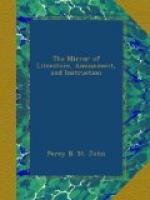The scientific men to whom we are chiefly indebted for the facts accumulated on this subject, are Dr. Blumenbach, of Goettingen, Dr. Pritchard, of Edinburgh, and the eminent surgeon, Mr. Lawrence. It has been a favourite matter of speculation with Lord Monboddo, as well as with Voltaire, Rousseau, and the philosophers of the French school, who have endeavoured to show that men and other animals are endowed with reason or instinct of the same kind, but of different degrees. According to these fanciful writers, the monkey is but another species of the human race, and has been termed by them Homo Sylvestris. They made the most diligent researches into all accounts concerning men in a savage state, and were delighted beyond measure with the discovery alleged to have been made in the island of Sumatra, of men with tails regularly protruding from their hinder parts, who, according to Buffon, walked and talked in the woods like other gentlemen:—
And backwards and forwards they switched
their long tails,
Like a gentleman switching his cane.
The appearance of Peter the Wild Boy, who was found in the woods of Hamela, in Hanover, living on the bark of trees, leaves, berries, &c. threw Voltaire into transports of joy. He declared the event to be the most wonderful and important that ages had recorded in the annals of science, as it demonstrated the fact of man living after the fashion of beasts, without the least spark of civilization, and without speech; thereby forming a species of a nature having more in common with monkeys than with men, and presenting the regular degree, or intermediate class, between the homo civilis and the homo sylvestris.




